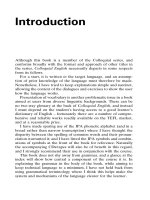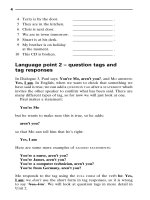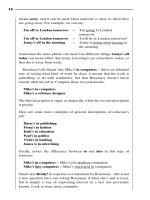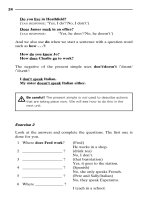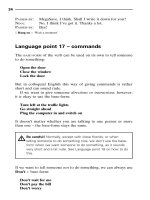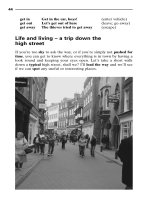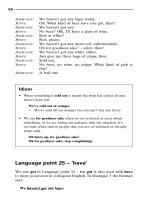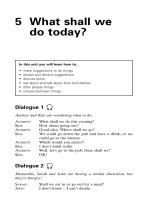A complete English language course part 4
Bạn đang xem bản rút gọn của tài liệu. Xem và tải ngay bản đầy đủ của tài liệu tại đây (89.74 KB, 10 trang )
means away, and it can be used when someone is away or when they
are going away. For example, we can say:
I’m off to London tomorrow = ‘I’m going
to London
tomorrow’
I’m off in London tomorrow = ‘I will be in London tomorrow’
Jenny’s off in the morning = ‘Jenny is going away
/leaving
in
the morning’
Sometimes the same phrase can mean two different things: Jenny’s off
today can mean either that Jenny is leaving to go somewhere today, or
that she is away from work.
Rosemary tells Stuart that Mike’s in computers – this is an informal
way of saying what kind of work he does; it means that his work is
something to do with computers, but that Rosemary doesn’t know
exactly what his job is. Compare these two statements:
Mike’s in computers
Mike’s a software designer
The first description is vague or unspecific, while the second description
is precise.
Here are some more examples of general descriptions of someone’s
job:
Harry’s in publishing
Fiona’s in fashion
Kath’s in education
Paul’s in politics
Vicki’s in banking
James is in advertising
Finally, notice the difference between in and into in this type of
sentence:
Mike’s in
computers = Mike’s job involves computers
Mike’s into
computers = Mike’s interested in computers
Stuart says Really? in response to a statement by Rosemary – this is not
a true question (he’s not asking Rosemary if what she’s said is true),
but is simply a way of expressing interest in a fact not previously
known. Look at some more examples:
14
I’m going to sail to New Zealand in my yacht – Really?
Norman’s bought another horse – Really?
Chocolate is an aphrodysiac – Really?
More than a billion people speak Chinese – Really?
Stuart adds Like me! to say that what Rosemary has just told him
is true of Stuart as well. He could also have said Me too!, Same here!
or So am I! Here are some more examples:
Posh and Becks are English – Like me!
Terry’s a long-distance lorry driver – Me too!
My brother’s an accountant – Same here!
Gerry’s going to Spain this summer – So am I!
The first three responses can be used in all situations; but be careful
with So am I! – it can only be used in answer to a statement using the
verb be (on its own or in conjunction with another verb, as in the last
example above).
Dialogue 12
Now Ann introduces Marian to Rosemary.
A
NN
: Rosemary, this is Marian – she’s from Brighton.
R
OSEMARY
: Hello, Marian – what do you do for a job?
M
ARIAN
: I’m a teacher.
R
OSEMARY
: So am I! Where do you teach?
M
ARIAN
: In the college here. What about you?
R
OSEMARY
: I teach in a primary school.
Language point 9 – ‘a’/‘an’ and ‘the’
In Dialogue 9, Rosemary says I teach in a primary school – she uses
the
INDEFINITE ARTICLE
with the noun because it is the first time it
has appeared in the conversation. This is why we use the indefinite
article when we say what someone’s job is:
I’m a doctor Suzi’s a teacher
James is an airline pilot she’s a nurse
he’s a footballer Paul’s a university lecturer
1111
2
3
4
5
6
7
8
9
10
11
1211
13
14
15
16
17
18
19
20
21
22
23
24
25
26
27
28
29
30
31
32
33
34
35
36
37
38
39
40
41
4211
15
Jeremy’s a poet Harold’s an estate agent
Jane’s an orthodontist Mike’s a surgeon
Fiona’s an archaeologist
The indefinite article has two forms: a and an – you can tell which
one to use by the sound of the word that follows:
• if the following word begins with a
CONSONANT
sound,
we use a
• if the following word begins with a
VOWEL
sound,
we use an
Remember that it is the sound that is important, not the spelling.
In the list above you can see that Paul is a university lecturer – the
word university begins with a vowel in writing, but the first sound
of the word is /j/, which is a consonant sound, so a is correct here.
Pronunciation
Many very commonly used words in English have both
STRONG
and
WEAK
pronunciations. In normal speech we use the weak pronunci-
ation of these words, unless we want to emphasise them for some
reason.
The weak pronunciations of the indefinite article are /ə/ and
/ən/ – make sure you use these when you are speaking! We will
meet a lot more weak pronunciations in Unit 2 (Language point 13).
Exercise 6
Look at these people’s jobs – complete these sentences using a or
an.
1 John’s ___ doctor.
2 Fiona’s ___ nurse.
3 My sister’s ___ university student.
4 My father’s ___ pilot.
5 Dave’s ___ architect.
6 Simon’s ___ writer.
7 Suzie’s ___ optician.
8 My father’s ___ airline pilot.
9 Kath’s ___ psychologist.
10 Roger’s ___ assistant librarian.
16
Exercise 7
Listen to the audio of people telling you their names and their jobs,
then fill in the information.
1 Pete – lawyer
2 ____ – architect
3 James – ______
4 Helen – ______
5 Susan – ______
6 _____ – taxi driver
7 _____ – actor
8 _____ – farmer
9 Henry – ______
10 Lisa – ______
We use the
DEFINITE ARTICLE
the when talking about something that
has already been mentioned, or that we know about anyway:
James is taking a
taxi to the airport
Tom works in an
office in the city
We already know about the airport, and about the city, but not
about the taxi or the office – these are ‘new information’.
old information – ‘the’
new information – ‘a’/‘an’
We also use a/an to talk about one thing out of many, and the to
talk about a unique thing:
The sun is a star
(There is only one sun, but there are many stars)
This is a large room, but that is the largest room in the hotel
(There are many large rooms in the hotel, but only one of
them can be the largest)
1111
2
3
4
5
6
7
8
9
10
11
1211
13
14
15
16
17
18
19
20
21
22
23
24
25
26
27
28
29
30
31
32
33
34
35
36
37
38
39
40
41
4211
17
Be careful! The definite article the is used with both singular
and plural nouns, but the indefinite article is only used with
singular nouns.
ƽ
Pronunciation
The is pronounced /ðə/ before
CONSONANT
sounds, but /ð/ before
VOWEL
sounds:
the nurse /ðə ns/
the architect /ð `ɑktεkt/
the university /ðə jun`vsti/
the hour /ð `ɑuwə/
Exercise 8
Complete these sentences using a/an or the. Don’t worry if you
don’t completely understand the sentences – concentrate on the
types of nouns.
1 Please could you tell me where ___ bank is?
2 We’re going to ___ cinema after lunch.
3 ___ streets in ___ town centre are flooded.
4 We’re staying in ___ large room on ___ fifth floor.
5 You need ___ telescope to see ___ Moon in detail.
6 Would you like ___ cup of tea?
7 What’s ___ weather like today?
8 Have you got ___ ten-pound note I could borrow?
9 Paris is ___ capital of France.
10 ___ Russian Federation is ___ very large country.
Dialogue 13
Vicki’s leaving early, but she doesn’t forget to say goodbye to Helen,
Jenny, Stuart and Rosemary.
V
ICKI
: I’m off now – bye, everybody!
H
ELEN
: Bye, Vicki!
J
ENNY
: Bye, Vicki – see you tomorrow!
S
TUART
: See you, Vicki!
R
OSEMARY
: Bye, Vicki!
18

